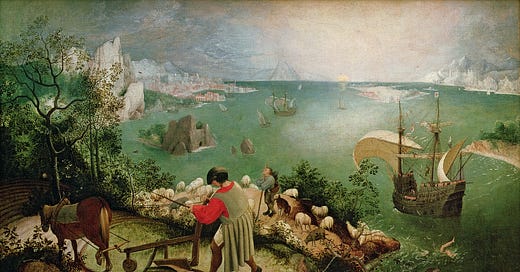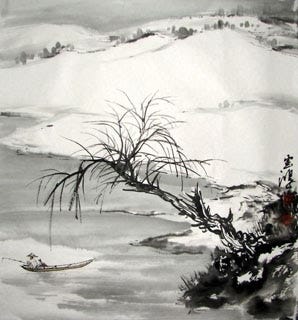River Snow
Liu Zongyuan
Across a thousand mountains
bird flight
ends
The paths that people made have been erased
A lonely boat contains a hat and cloak
A lonely fisherman
in river snowThis poem by Liu Zongyuan (773-819) has been the subject of intense artistic activity, and we still have paintings of this scene from the Song Dynasty onwards. It’s easy to see why: the poem has a brilliant visual flair. But it is not easy to capture in a still painting because of two separate visual techniques. The first is explaining what we can’t see; the second is a lovely “zoom in” of focus from the large to the small.
The first two lines (four lines in my translation) focus on the elements of the scene that we cannot see: the birds that have been driven out of the sky by the snow, and the mountain roads and trails that have been covered up. This section also establishes the broad view that we begin with.
The third line zooms in with a series of nouns: lonely boat, cloak, hat, old man. It draws our focus from the landscape level directly to the human level. Our sympathy for the fisherman is sparked by the series of contrasts with the birds safe in their nests, mountain walkers sheltering from the weather, and the looming scale of the landscape over the single shivering man.
Perhaps more than any of the paintings directly inspired by the poem, it makes me think of Breugel’s Landscape with the Fall of Icarus. In that painting, more than a metre wide, the pathos of the death of Icarus is highlighted by the small size of his death, and its failure to impact the rest of the landscape or characters.
To create a similarly chilling effect, Liu Zongyuan used just twenty spare Chinese characters.
柳宗元 江雪
千山鸟飞绝,万径人踪灭。
孤舟蓑笠翁,独钓寒江雪。




